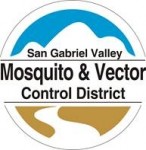 Press Release posted 6/8/12 – A dead crow from the city of Sierra Madre has tested positive for West Nile virus (WNV). This is the first indication of WNV activity in the San Gabriel Valley this year. Mosquitoes trapped in the area today will be tested for virus. Results from this test will be available Monday, June 11, 2012.
Press Release posted 6/8/12 – A dead crow from the city of Sierra Madre has tested positive for West Nile virus (WNV). This is the first indication of WNV activity in the San Gabriel Valley this year. Mosquitoes trapped in the area today will be tested for virus. Results from this test will be available Monday, June 11, 2012.
Warmer temperatures provide ideal conditions for WNV amplification and transmission. Mosquitoes pick up WNV from infected birds and spread it to other birds when they bite again. People can also get WNV if bitten by an infected mosquito.
Dead birds are often the first indication of WNV activity in an area. Residents are encouraged to report dead birds to the State hotline (877)WNV-BIRD (968-2473) or online at www.westnile.ca.gov and mosquito problems to their local District.
It is critical that residents survey their property and remove all standing water to prevent mosquito reproduction. Mosquitoes lay their eggs in stagnant water sources such as neglected pools, buckets, misc. containers, puddles and ponds. Eggs can hatch and mature to biting adults in 5-7 days.
Since its introduction in 2003, there have been 3,146 reported infections and 110 deaths from WNV in California. West Nile virus is present and a risk to public health every year.
Throughout the summer, basic protective measures should be followed:
□ DRAIN: Check properties weekly and remove all sources of standing water. Report ‘green’ inoperable pools or other sources of standing water to the District
□ DAWN AND DUSK: Wear effective repellents if outdoors when mosquitoes are present (between dusk and dawn)
□ DEFEND: Ensure doors and windows are properly screened
The District encourages the public to help identify WNV “hot spots” by reporting dead birds to the WNV Hotline at (877) WNV-BIRD (877-968-2473) or online at www.westnile.ca.gov. We also urge our residents to call the District to report any mosquito activity.
The San Gabriel Valley Mosquito & Vector Control District is a public health agency dedicated to the control of mosquito and other vector-borne diseases. The District can be reached at 626-814-9466 or on the web at www.sgvmosquito.org
